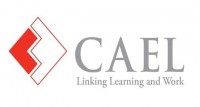CAEL to Offer Support for Graduate-Level Prior Learning Assessment

Time- and Cost-Saving Prior Learning Assessment Shown to Encourage Postsecondary Completion
CHICAGO, IL, UNITED STATES, July 13, 2017 /EINPresswire.com/ -- Since the concept was developed in the 1970s, the Council for Adult and Experiential Learning (CAEL) has been a leading advocate for prior learning assessment (PLA), a method of awarding credit for demonstrated evidence of prior learning. Now, building off its reputation as a leader in PLA development and advocacy, CAEL is introducing a PLA solution for a new audience: graduate students.Beginning in July, CAEL will offer graduate-level portfolio assessment through its LearningCounts online portfolio assessment service. LearningCounts provides colleges and universities with PLA support, including student guidance, advisor training, portfolio evaluation and strategies for using PLA as a recruitment and retention tool.
LearningCounts has traditionally served only students at the associate or bachelor’s degree level. Institutions that join the LearningCounts network and opt to provide graduate-level assessment will be able to direct their graduate-level students to CAEL's self-directed course in how to develop a graduate-level portfolio. Students will then submit their portfolio, which will be evaluated by faculty assessors using the CAEL platform and a graduate-level rubric to determine if credit should be awarded.
In addition to the graduate portfolio development course and assessment, CAEL is offering monthly online Faculty Assessor Training workshops to prepare college and university faculty to become undergraduate and graduate evaluators. Institutions who wish to use the LearningCounts tools, course, platform and rubric, but their own faculty for assessment, can send faculty through this workshop to appropriately prepare them for assessment of prior learning. If schools wish to conduct graduate-level assessment on their own, the training is still valuable in assisting faculty to follow CAEL's standards of assessment. Topics in the workshop include PLA Principles of good practice in action, the difference between assessing learning in the classroom and through PLA portfolios, and providing clear and supportive feedback to students.
Students and colleges and universities alike benefit from PLA. A 2010 CAEL study of more than 62,000 students found that those who took advantage of PLA were two-and-a-half times more likely to complete their degree. Those students also took an average of 9.9 more course credits than their counterparts who did not use PLA, resulting in more course enrollments for the institution. With the addition of graduate-level PLA, a new cohort will join the thousands of students who have already taken advantage of PLA to support academic goals.
"Graduate-level PLA meets the rapidly growing demand for higher-level prior learning portfolio assessment," said CAEL CEO and President Pamela Tate. "Since it was first offered, countless students have taken advantage of PLA to complete their undergraduate degree programs. With graduate-level PLA, we're extending that support to more students than ever before, embodying our mission of making it easier to for students to get the education they need."
For more information about LearningCounts, visit LearningCounts.org.
About the Council for Adult and Experiential Learning (CAEL)
The Council for Adult and Experiential Learning (CAEL) is a nonprofit 501(c)(3) organization based in Chicago that assists adults with their educational endeavors, finding practical ways to help them earn college credit for learning acquired through life and work experiences toward the completion of a postsecondary degree. CAEL works with the public sector, private sector industries and higher education institutions to ensure that adult students receive the most efficient training and education to occupy a meaningful professional place in a 21st century economy. For more information, visit www.cael.org.
Jackie Clark
CAEL
2402521340
email us here
